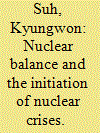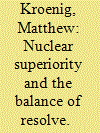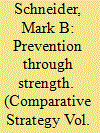|
|
|
Sort Order |
|
|
|
Items / Page
|
|
|
|
|
|
|
| Srl | Item |
| 1 |
ID:
150092


|
|
|
|
|
| Summary/Abstract |
This article investigates the nuclear postures available to Israel in the wake of the Joint Comprehensive Plan of Action (JCPOA) between Iran and the P5 + 1. An “existential bias” pervades much of the literature on nuclear postures. Most scholars assume that once a state acquires the bomb it can deter all forms of aggression. However, recent scholarship has shown this to be untrue given that regional nuclear powers operate under much greater constraints than the U.S. and Russia or the Soviet Union. Israel faces tradeoffs between three postures: a catalytic posture, which would involve greater reliance upon the U.S.; assured retaliation, its current posture; and first use. Should Jerusalem continue to fear the prospect of abandonment by the U.S., it may turn to a first-use posture in order to leverage its conventional and nuclear superiority over its neighbors.
|
|
|
|
|
|
|
|
|
|
|
|
|
|
|
|
| 2 |
ID:
190844


|
|
|
|
|
| Summary/Abstract |
The nuclear competition school, an emerging theoretical perspective on the political effect of nuclear weapons, argues that a favorable nuclear balance can significantly reduce one’s expected costs of nuclear war and therefore affect the interaction between nuclear-armed states, such as deterrence and crisis outcomes. This new perspective also presents a wide array of empirical evidence demonstrating the significant effect of the nuclear balance of power on political outcomes, thereby challenging the theory of the nuclear revolution, which argues that the nuclear balance of power produces no meaningful effects on political outcomes because no state can escape costly nuclear destruction. Little attention, however, has been paid to systematically exploring the effect of the nuclear balance on the initiation of nuclear crises. This is surprising, given that observable factors, such as the nuclear balance, should have a powerful effect at the crisis initiation stage because countries can observe military balance and assess the costs and benefits of entering a crisis. This article tests a core argument of the nuclear competition school regarding the effect of the nuclear balance on the initiation of nuclear crises. With original data on strategic nuclear balance, my statistical analysis shows that having a superior nuclear arsenal than another nuclear-armed opponent does not lead to a reduced likelihood of nuclear crisis initiated by the opponent. These core findings hold after conducting a series of robustness tests with various measures of the balance of nuclear forces. They encourage us to reconsider the persuasiveness of the nuclear competition school and offer implications for US nuclear policy and force size.
|
|
|
|
|
|
|
|
|
|
|
|
|
|
|
|
| 3 |
ID:
186186


|
|
|
|
|
| Summary/Abstract |
Does nuclear superiority offer states political or military benefits? And do those benefits accrue beyond acquiring a secure second-strike capability? International relations theory has long held that nuclear superiority does not confer significant advantages, a conclusion supported by much of the qualitative literature on bargaining and crisis interactions between nuclear-armed states. New work by scholars using statistical methods to analyze data on nuclear crises, interstate disputes, and compellent threats has sought to answer these questions, producing conflicting results. Despite the contributions of these recent works, this line of research has assumed that warhead counts are an appropriate measure of nuclear capabilities and that states possess accurate information about the material balance. Instead, states use multiple quantitative and qualitative characteristics to evaluate the nuclear balance, and they often have inaccurate or incomplete information about the size, composition, and configuration of other states' nuclear forces. Using new data, replications of two prominent recent works show that results are sensitive to how the nuclear balance is operationalized. Drawing on archival and interview data from the United States and the Soviet Union during the Cold War, findings show how states and leaders often understand and respond to the nuclear balance in inconsistent, asymmetric, and subjective ways.
|
|
|
|
|
|
|
|
|
|
|
|
|
|
|
|
| 4 |
ID:
117996


|
|
|
|
|
| Publication |
2013.
|
| Summary/Abstract |
Scholars have long debated whether nuclear superiority or the balance of resolve shapes the probability of victory in nuclear crises, but they have not clearly articulated a mechanism linking superiority to victory, nor have they systematically analyzed the entire universe of empirical cases. Beginning from a nuclear brinkmanship theory framework, I develop a new theory of nuclear crisis outcomes, which links nuclear superiority to victory in nuclear crises precisely through its effect on the balance of resolve. Using a new data set on fifty-two nuclear crisis dyads, I show that states that enjoy nuclear superiority over their opponents are more likely to win nuclear crises. I also find some support for the idea that political stakes shape crisis outcomes. These findings hold even after controlling for conventional military capabilities and for selection into nuclear crises. This article presents a new theoretical explanation, and the first comprehensive empirical examination, of nuclear crisis outcomes.
|
|
|
|
|
|
|
|
|
|
|
|
|
|
|
|
| 5 |
ID:
087987


|
|
|
|
|
| Publication |
2009.
|
| Summary/Abstract |
The proliferation of weapons of mass destruction is clearly one of the greatest security threats the Western world faces today. Counterproliferation has been one of the core objectives of the Bush administration from its first days in office. While there is bipartisan support in the United States for the concept that proliferation represents a serious threat, there is substantial disagreement on how to deal with this threat.
|
|
|
|
|
|
|
|
|
|
|
|
|
|
|
|
|
|
|
|
|